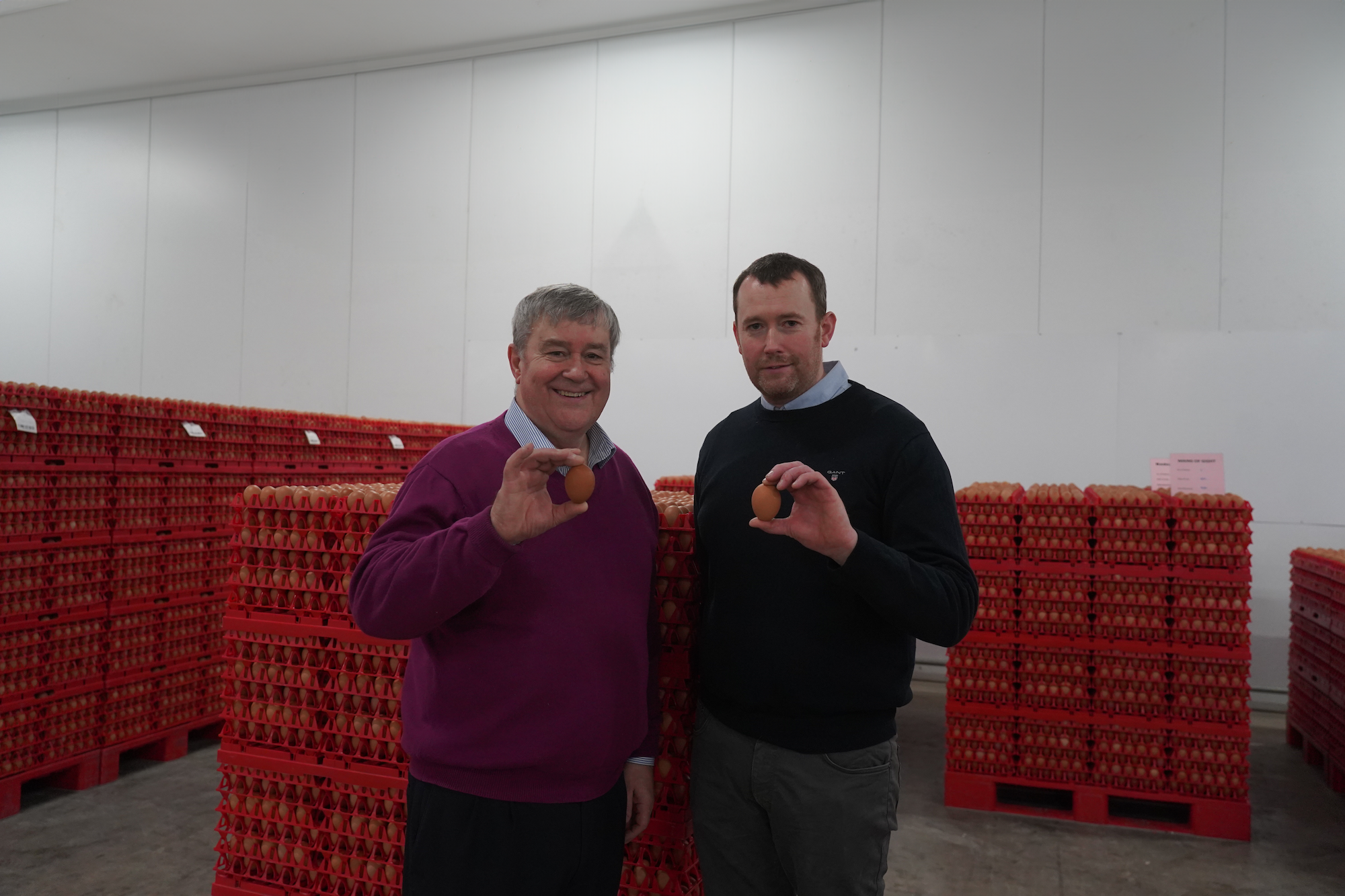Family-owned egg producer Farmlay hands over reigns to next generation

Robert Chapman with son Iain Chapman
Scottish egg production stalwart, Robert Chapman, has announced he is passing the mantle of managing director to his son Iain, 40, while retaining his role as executive chair.
The 67-year-old says now is the perfect time – having recently come through a very busy couple of years which has included securing lucrative long-term contracts with supermarkets Aldi and Lidl. Farmlay also supplies Spar and all Morrisons’ supermarkets in Scotland.
“It’s just natural succession,” said Robert, who left school at 15 with the dream of owning 100,000 hens and 1,000 acres of farmland. He steps down as MD with the business owning 450,000 hens – and a further 550,000 owned by contract producers – and 2,500 acres of land – a nearly 20-fold increase from the 130 acres he started out with.
Robert added: “My father let me get on with making my mark on the farm and it’s only right that I do the same for Iain. I love everything about Farmlay; especially all the people who have been on this amazing journey with us.
“But I owe it to my wife Ethel – who has worked alongside me growing the business and been the most marvellous support – to finally spend some more time with her and the grandchildren.”
It is not only more family time Robert, who puts his boundless energy and enthusiasm down to always starting the day with two softly boiled eggs for breakfast, has booked into his diary. In January, he has been invited to be a speaker on the panel reflecting on the keynote Oxford Farming Conference 2024 Report, which this year centres on the food supply chain.
“Eggs are nature’s convenience food,” smiled Robert. “Cheap, wonderful tasting and full of vitamins.”
Iain, who has worked for Aberdeenshire-based Farmlay ever since he was old enough to help collect the eggs – apart from studies at SRUC and travels in Australia – has played a key role in the growth of the business.
One area he is keen to expand yet further is the 500,000 additional hens kept by other farmers on a contract basis under the Farmlay wing. While it was no joke at the time, he believes the 2022 images of supermarket shelves empty of eggs – the result of a combination of factors including high energy and feed prices along with the risk of avian flu – has inadvertently resulted in a “golden age” for egg producers.
“Nobody wants to see that happen again – least of all the supermarkets – and the five-year rolling contracts we now have in place are providing an exciting opportunity to other farmers,” explained Iain.
“There is a good return to be had from hens; ideal for a member of the family wanting to come home to the farm or for those looking for diversification. These new long-term contracts mean our market is more profitable than ever, with full costs tracking for feed, energy and labour leaving a good margin.
“We work with farmers every step of the way, from planning permission for sheds, through to building work, lighting, supplying the birds, feeding, audits and support with all the paperwork. As farmers ourselves we understand what we need to offer help and support with.”
Iain’s wife, Debbie, will be joining the board and working alongside him in the Farmlay office.
“Like dad who has had mum by his side, I am lucky that Debbie works within the business,” said Iain, who is father to six-year-old Megan, three-year-old Molly and seven-month-old Emma.
“She’s had her hands full recently with the girls, but the time’s right for us now and we’re excited about following in mum and dad’s footsteps.”
In addition to 1,700 acres of cereals made up of winter and spring barley, winter oilseed rape and winter wheat, the Chapman family run 230 commercial suckler cows at their 2,500-acre Cockmuir Farm, near Strichen, Aberdeenshire. They try to grow as much wheat as possible in the rotation to feed the birds, with the remaining acreage grass and woodland.
Working closely with surrounding farmers when it comes to joint business deals such as buying in cereals for the 400-tons-a-week needed for the feed milling operation or providing poultry manure as fertiliser is at the very heart of the Farmlay enterprise.
The family has invested heavily in both environment and welfare – planting more than 10,000 trees to enhance the hens’ habitat – as well as solar, biomass and wind-powered renewable energy. A sum of £3.5 million was recently invested in the packing centre which included another robot adding to the existing six used in the grading facility and another planned for 2024 to increase efficiency.







